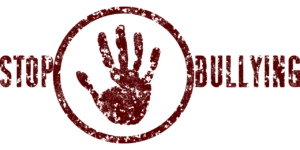In this previous blog, I talked about what your child does not tell you about bullying. This is the second of three blogs in that series. They can be read on their own, but I encourage you to read all three! In this one I will talk about what you can do as parents when your child is the victim of bullying.
 Finding out that your child is a victim of bullying can be hard on parents. It can be difficult to control the urge to yell at the school, the other child, or the child’s parents. The problem is that will only be a short-term solution to a problem that will most likely continue, which can lead to parents feeling helpless. My hope is that with this blog you can find other suggestions that can help both you and your child. Before I begin, I do want to warn you, make sure that all these suggestions are made with your child and teen involved in the conversation. Many of these options, when not communicated properly to your child, can be viewed as a punishment for them. That is the last thing that we want to promote when the topic of bullying is involved.
Finding out that your child is a victim of bullying can be hard on parents. It can be difficult to control the urge to yell at the school, the other child, or the child’s parents. The problem is that will only be a short-term solution to a problem that will most likely continue, which can lead to parents feeling helpless. My hope is that with this blog you can find other suggestions that can help both you and your child. Before I begin, I do want to warn you, make sure that all these suggestions are made with your child and teen involved in the conversation. Many of these options, when not communicated properly to your child, can be viewed as a punishment for them. That is the last thing that we want to promote when the topic of bullying is involved.
The first option is in my opinion, not truly an option, and that is to get your child involved in counseling at least on a bi-weekly basis. I personally believe that anyone can benefit from therapy, so it is easy for me to decide that this is the first step. Bullies tend to use the traits that we already are self-conscious about against us. After a while it can be hard not to believe what the bully is saying. Therapy will allow your child to have a safe environment to express these cognitions and beliefs while also learning how to challenge them and create new more positive beliefs. This can also be a safe place for your child or teen to talk about self-harm and suicidal urges or actions that can be a result of bullying.
The next option that you have is to bring it to the attention of the administration at school. I want to give some warnings when it comes to this suggestion. Please make sure that your child is involved in this option. This is one of the options that can be seen as punishing to children/teens, not because of your action but because of the reaction of the school and administration. The goal of going to administration is to make them aware that the event is occurring and coming up with a plan to help your child feel safe or have a safe place to go when bullying occurs. Why this is punishing is because often schools will pull both the student being bullied and the bully into the same room and have them sign a non-contact agreement. This can lead to the bullying behavior escalating. If you decide to go to administration, make sure to have a plan that you, your child, and maybe your child’s therapist have agreed upon to help them cope with the bullying behavior, so that administration can help you incorporate that plan.
Another option that you can use is to validate your child’s experience. Allow them to have the space to share their experience and vent about the situation. To learn how to incorporate validation in your communication with your child refer to this blog Dr. Desirae Allen wrote on validation. Please remember that sometimes your child does not want you to give them suggestions on how to fix the problem, they just want you to listen and validate their experience.
The final option that I have for you is in fact a DBT skill. Work with your child to create a cope ahead plan for how to manage their emotions that occur when they are experiencing bullying. Create a plan of effective coping skills that they can use in the moment and afterwards. If your child is currently or in the past been involved in DBT skills, I would recommend using distress tolerance skills (TIP or Distract) and emotion regulation skills (check the fact, and opposite action). If your child needs physical items to incorporate this plan, I encourage you to allow them these items.
 The final word I want to have on this subject is know that you are doing your best to manage this issue. Bullying is at epidemic levels in the U.S., but it is often silent and ignored in society. You will have hurdles in your experience that you have to navigate to help your child. Just know that your actions, when done with the best intention for your child, are all that you can do. If you are curious about what you can do to help combat bullying on a societal level, keep an eye out for my final blog in this series
The final word I want to have on this subject is know that you are doing your best to manage this issue. Bullying is at epidemic levels in the U.S., but it is often silent and ignored in society. You will have hurdles in your experience that you have to navigate to help your child. Just know that your actions, when done with the best intention for your child, are all that you can do. If you are curious about what you can do to help combat bullying on a societal level, keep an eye out for my final blog in this series
About the Author
Samantha Ruwe (she/her), M.A., LPC is a Licensed Professional Counselor who specializes in dialectical behavior therapy. She works with teens and adults in a warm, compassionate, and non-judgmental manner to help clients build a life worth living. Samantha knows that therapy can be daunting to begin and is supportive of clients at all parts of their counseling journey. Click here to learn more about Samantha’s experience and therapeutic approach.

